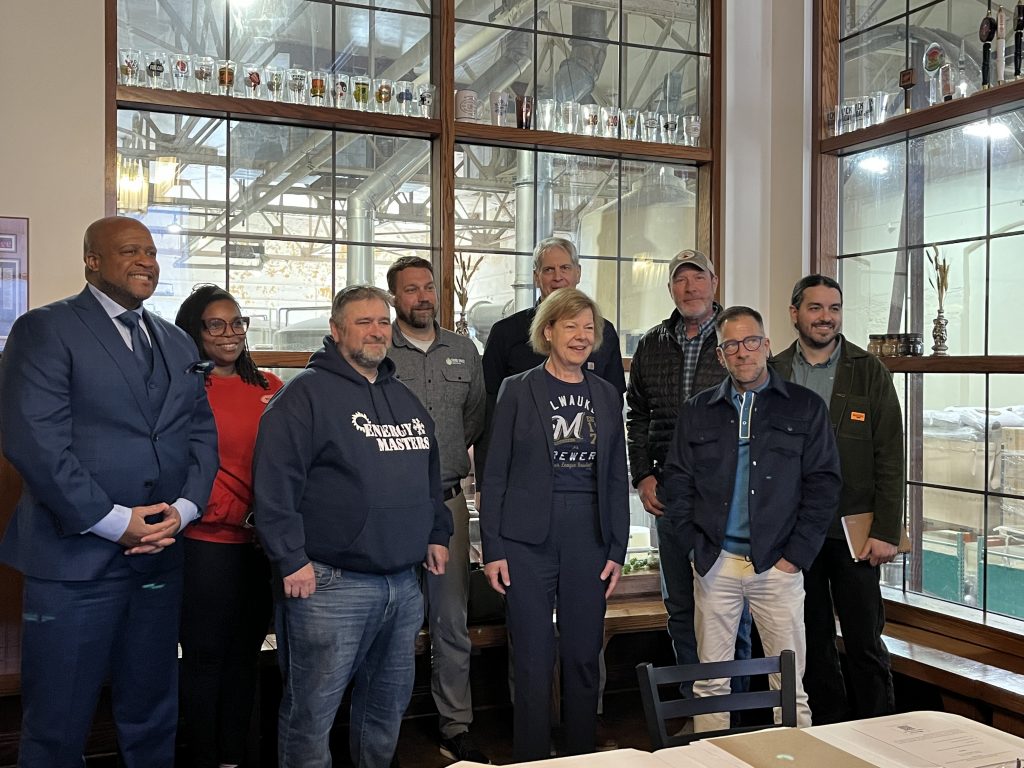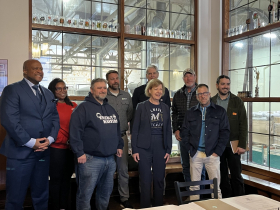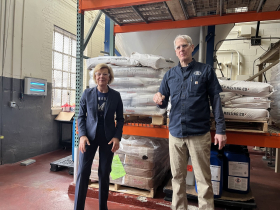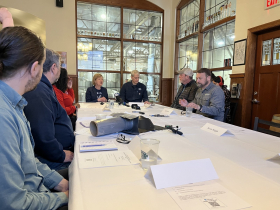Tammy Baldwin Talks Tariffs With Local Business Owners
Senator spoke with brewers, farmers, chefs and others lamenting tariffs at roundtable.

Senator Tammy Baldwin led a roundtable with business owners Monday to discuss tariffs. Photo taken April 14, 2025 by Sophie Bolich.
Senator Tammy Baldwin met with small business owners in Milwaukee on Monday to discuss the impacts of the Trump Administration’s tariffs.
From aluminum cans and auto parts to roofing nails and Belgian malt, entrepreneurs said they’re feeling financial pressure across the board — even as some tariffs are temporarily suspended.
“Uncertainty is the biggest challenge to us right now,” said Andy Gehl, co-founder of Third Space Brewing Company, during a roundtable discussion at Lakefront Brewery. “We haven’t seen any price increases directly yet, but we are bracing ourselves. And with this seesaw back and forth … it’s incredibly challenging to run a small business.”
Additional participants included Russ Klisch of Lakefront Brewery, Gregory León of Amilinda, Ryan Bandy of Indeed Brewing Company, Sandy Syburg of White Oak Farm, Natasha Broxton of Select Auto Parts & Sales, Jim McGuigan of Energy Masters LLC and Ugo Nwagbaraocha of Diamond Discs International.
Earlier this year, after campaigning on a promise to enrich U.S. citizens through tariffs, President Donald Trump rolled out a flurry of foreign taxes throughout his first three months in office. Some were paused before implementation, but others remain.
As of April 14, most imports from two of Wisconsin’s top trading partners — Mexico and Canada — are taxed at 25%, with limited exemptions. A separate 10% tariff applies to Canadian energy exports, including oil, natural gas, and electricity. Imports from China — also a top Wisconsin trading partner — are now subject to a whopping 145% tariff.
The United States has also implemented a 10% tariff on nearly all imports from most other countries, excluding Canada and Mexico. Larger, reciprocal tariffs were expected last week, but have been delayed.
“Small businesses — breweries, manufacturers, farmers — all are feeling the impact of this,” Baldwin said. “A president who promised to lower costs on day one is doing very focused things to raise costs.”
While the Trump administration has stated that tariffs encourage domestic manufacturing and spur economic growth, business owners argued the taxes are wreaking havoc on their operations, making it difficult to retain customers, package products and plan for future expansion.
“One of the biggest challenges that we’ve seen is the uncertainty. How do you invest in an uncertain market?” said Nwagbaraocha, whose Milwaukee-based company supplies construction tools to sites across the nation. “We all want to increase manufacturing locally here in America, but this is not the way to do it.”
Bandy, chief business officer for Indeed, echoed Nwagbaraocha, emphasizing the disproportionate impact on local operations. “The chaos alone is enough to throw a small business off,” Bandy said.
In addition to price hikes on aluminum — a key material for the Indeed’s canned beers — the uncertainty surrounding tariffs has stalled progress on a capital expenditure project at the brewery after pre-budgeted prices jumped 30%, Bandy said. “We started six months ago, and now I don’t know if we can finish it.”
“Chaos is its own kind of tariff, right?” Baldwin said. “We need certainty to plan. We need certainty to move forward.”
Klisch, who led a brewery tour to kick off the event, pointed out key equipment and ingredients sourced from abroad: Belgian malts, German centrifuges and tanks made with materials from both the U.S. and Canada. While Lakefront and other breweries could, in some cases, pivot to American-made alternatives, brewery owners agreed the resulting beer wouldn’t be the same.
“Germany has the best technology,” Klisch said of the centrifuge. “It would be great to have it from the United States, but I don’t know anyone here who’s making it like this.”
León, owner of the James Beard Award-nominated Amilinda, is facing similar challenges. With a menu focused on Spanish and Portuguese dishes, imports are essential to the restaurant’s inventory.
“Restaurants operate on very slim margins, plus there’s the stress of not knowing if or when things are going to happen,” León said. “We can pass that on to the consumer — we’ll have to — but obviously, the higher the prices, the fewer people we’re going to see.”
For Syburg, tariffs are an added strain on the already-unpredictable world of organic farming. This year, he missed the window to source clover — a cover crop and natural fertilizer — from Canada due to increased prices and hesitancy from the seller. U.S.-grown clover from the Pacific Northwest isn’t a viable alternative, as it can no longer withstand Wisconsin’s harsh winters.
“There’s uncertainty that is beyond our control — Mother Nature, etcetera, and then there’s the uncertainty that is totally controllable,” Baldwin said. “That’s what’s so frustrating about this.”
While they worry for their own survival, business owners also shared concern for their clients.
“A lot of our customers are living paycheck to paycheck,” said Broxton, president at Select Auto Parts. “They come to me because they can get affordable, reliable auto parts. And when tariffs drive up costs, it makes it harder to grow.”
McGuigan, whose business repairs and replaces roofing, siding, windows and gutters, said price increases are “hurting real people,” specifically homeowners with little to no disposable income.
“We’re in a culture of frugality here in Wisconsin, and I’m very proud of our Wisconsin heritage, but people shouldn’t have to make a decision between something that’s going to last them and something that’s going to fall apart in five or 10 years.”
Baldwin concluded the roundtable by encouraging business owners to continue sharing their stories. She also accused Trump of leveraging tariffs in order to “get as much money as possible for his new tax cuts for billionaires and corporations.”
While sharing her support for purchasing American-made products, the senator said she doubted that across-the-board tariffs had potential to create greater investment.
“I think there’s a wrong way and a right way… but, across the board with allies is just, in my mind, the wrong way to go about this. And, you know, aside from that, it has a huge impact on businesses.”
Photos
If you think stories like this are important, become a member of Urban Milwaukee and help support real, independent journalism. Plus you get some cool added benefits.
























